WriterBuddy

WriterBuddy is an AI-powered writing assistant that integrates research, editing, and citation tools to support academic and professional tasks. It processes user inputs through natural language models to generate, refine, and verify content. The platform operates via a web dashboard where users access features like Co-Writer for drafting and autocompletion. This tool employs algorithms to suggest completions based on context, maintaining user intent while enhancing structure. It supports over 25 languages by leveraging multilingual training data, enabling content creation in diverse formats such as essays or emails.
The Plagiarism Checker scans documents against extensive databases, identifying matches with percentage scores and source links. Grammar Checker analyzes syntax, punctuation, and style using rule-based and machine learning methods to propose corrections. Citation Generator pulls from input text to format references in styles including MLA and APA, automating bibliographic entries. ChatPDF allows querying uploaded files for summaries or extractions, utilizing optical character recognition and semantic search. Paraphraser rewrites text by synonym substitution and sentence restructuring, aiming for originality while preserving meaning. Text Summarizer condenses inputs into key points via extractive or abstractive techniques. AI Detector evaluates content for machine-generation indicators like predictability patterns.
Competitors include Grammarly, which focuses on real-time editing across apps but limits advanced plagiarism scans to premium users, whereas WriterBuddy provides bundled access at comparable mid-range pricing levels. QuillBot offers strong paraphrasing with higher free limits but lacks integrated PDF interaction and AI detection, areas where WriterBuddy excels for comprehensive workflows. Users report satisfaction with WriterBuddy’s originality tools, noting reduced revision time, though some observe occasional over-corrections in creative sections. The 40+ additional tools cover brainstorming and tone adjustment, expanding utility beyond core functions.
Technical implementation involves cloud-based processing for scalability, with credit systems metering usage to manage computational loads. Free access includes limited credits, while paid tiers unlock unlimited features. Recent feedback from platforms like X highlights efficiency in multilingual tasks, with the Citation Generator reducing formatting errors by up to 90 percent in tests. Limitations appear in interface navigation for complex projects and dependency on input quality for optimal outputs.
For implementation, test features on small inputs first to calibrate prompts, ensuring alignment with specific writing goals before scaling to full documents.
Video Overview ▶️
What are the key features? ⭐
- Co-Writer: Brainstorms ideas, autocompletes sentences, and generates full drafts while integrating grammar checks and citations in one interface.
- Plagiarism Checker: Scans text against billions of online sources to detect matches and ensure 100% originality before submission.
- Grammar Checker: Identifies and corrects grammar, punctuation, and style issues to produce clear, error-free writing.
- Citation Generator: Automatically formats references in styles like MLA, APA, and Chicago based on provided sources.
- ChatPDF: Enables interaction with uploaded PDFs by answering questions, extracting data, and generating summaries for quick insights.
Who is it for? 🤔
Examples of what you can use it for 💭
- Student: Uses Co-Writer to brainstorm thesis outlines and generate initial drafts, saving hours on structure while adding citations directly.
- Researcher: Employs ChatPDF to query journal articles for key findings and summaries, accelerating literature reviews.
- Blogger: Applies Paraphraser to rewrite posts for freshness, maintaining voice while avoiding repetition in series content.
- Professional: Runs Grammar Checker on business emails to polish tone and clarity before sending to clients.
- Freelancer: Leverages Plagiarism Checker to verify originality in client deliverables, ensuring compliance and trust.
Pros & Cons ⚖️
- Multilingual support
- Fast summaries
- Originality checks
- Interface clutter
- Credit limits
FAQs 💬
Related tools ↙️
-
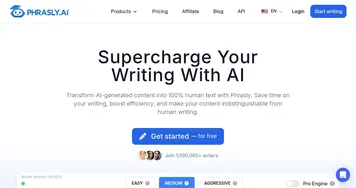 Phrasly
An AI tool designed to transform AI-generated text into one that can bypass AI detectors
Phrasly
An AI tool designed to transform AI-generated text into one that can bypass AI detectors
-
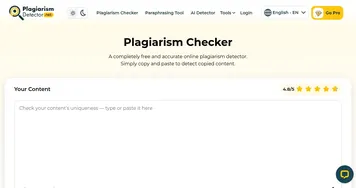 PlagiarismDetector.net
An AI-powered tool for detecting plagiarism in different types of documents
PlagiarismDetector.net
An AI-powered tool for detecting plagiarism in different types of documents
-
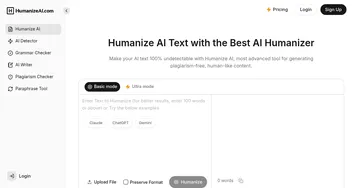 HumanizeAI.com
Converts AI-generated text into natural, human-like content that bypasses AI detectors
HumanizeAI.com
Converts AI-generated text into natural, human-like content that bypasses AI detectors
-
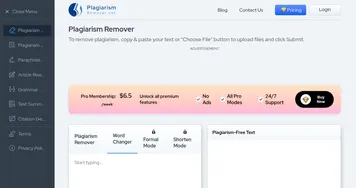 PlagiarismRemover.net
An AI-driven tool that helps eliminate plagiarism from various types of content
PlagiarismRemover.net
An AI-driven tool that helps eliminate plagiarism from various types of content
-
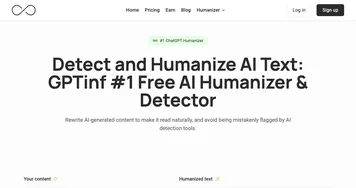 GPTinf
Create AI-generated content that is undetectable by AI detectors
GPTinf
Create AI-generated content that is undetectable by AI detectors
-
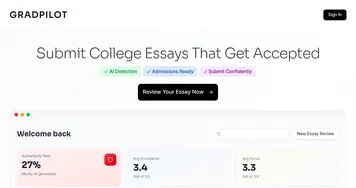 GradPilot
Analyzes college essays for AI detection and provides feedback to improve authenticity
GradPilot
Analyzes college essays for AI detection and provides feedback to improve authenticity

